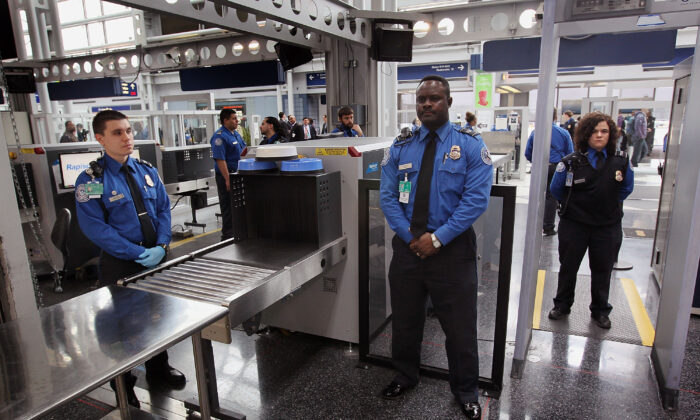A federal judge on Nov. 12 ruled that border agents can’t search international travelers’ electronic devices at airports and other U.S. ports of entry without “reasonable suspicion,” a move that could limit the otherwise growing practice.
The ruling by U.S. District Judge Denise Casper in Boston came after civil liberties activists brought a lawsuit in 2017 on behalf of 11 travelers. The lawsuit challenged the government’s power to search travelers’ smartphones and laptops for contraband like child pornography and counterfeit media, without being able to point to specific facts to justify their search.
Citing Fourth Amendment protections against unreasonable searches and seizures, Casper in a 48-page decision said U.S. Customs and Border Protection (CBP) and the U.S. Immigration and Customs Enforcement (ICE) must have at least a reasonable and individualized suspicion of criminal activity before conducting routine searches and seizures.
“The CBP and ICE policies for ‘basic’ and ‘advanced’ searches, as presently defined, violate the Fourth Amendment to the extent that the policies do not require reasonable suspicion that the devices contain contraband for both such classes of non-cursory searches and/or seizure of electronic devices; and that the non-cursory searches and/or seizures of Plaintiffs’ electronic devices, without such reasonable suspicion, violated the Fourth Amendment,” the ruling reads.
But Casper declined to force agents to have probable cause and secure warrants before searching devices, a higher standard sought by the plaintiffs’ lawyers at the American Civil Liberties Union (ACLU) and Electronic Frontier Foundation.
Esha Bhandari, staff attorney with the ACLU Speech, Privacy, and Technology Project, said in a statement that the ruling “significantly advances Fourth Amendment protections” for international travelers who enter the United States every year.
“By putting an end to the government’s ability to conduct suspicionless fishing expeditions, the court reaffirms that the border is not a lawless place and that we don’t lose our privacy rights when we travel.”
The number of electronic device searches at the border has ballooned in recent years, rising on a fiscal year basis from about 8,500 in 2015 to more than 30,000 in 2018, according to the ACLU.
Casper added that while authorities have “paramount” interest in protecting the border, the privacy interests of travelers, whose devices are searched without reasonable suspicion, had to balance against it to protect their personal information.
“This requirement reflects both the important privacy interests involved in searching electronic devices and the Defendant’s governmental interests at the border,” Casper wrote.
The ACLU said a number of travelers entering the United States in recent months have reported cases of improper searches.
An incoming 17-year-old Harvard University student from Lebanon was allegedly denied entry after an immigration officer at Boston Logan Airport searched his social media accounts and found comments from his friends critical of the U.S. government, Fox News reported.
ACLU staff attorney Sophia Cope said in a statement, “This is a great day for travelers who now can cross the international border without fear that the government will, in the absence of any suspicion, ransack the extraordinarily sensitive information we all carry in our electronic devices.”
Reuters contributed to this report.
This article is from the Internet:US Border Agents Can’t Search Travelers’ Devices Without ‘Reasonable Suspicion,’ Federal Court Rules
Supreme Court Justices Appear Inclined to Allow Trump to Terminate DACA
